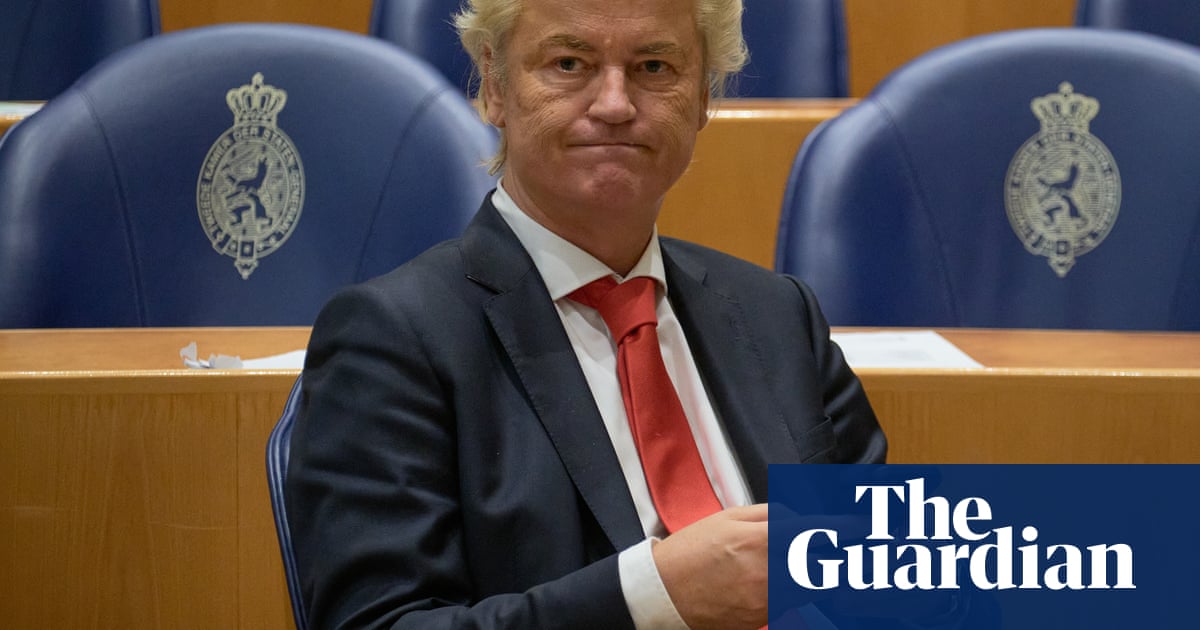It is a gamble that Geert Wilders may live to regret. Increasingly frustrated by his coalition partners’ unwillingness to embrace his promised “strictest asylum policy in Europe”, the Dutch far-right leaderbrought down the government.
Wilders’ calculation, if it is more than a fit of political pique, appears simple: if he can turn this autumn’s snap elections into a referendum on immigration and asylum, his Freedom party (PVV) can win it – and he might even become the Netherlands’ prime minister.
The plan, however, may well backfire, and for several reasons. Wilders has seriously alienated potential new coalition partners. The political landscape has changed. And polls suggest immigration and asylum are no longer voters’ biggest concern.
“I signed up for the toughest asylum policy, not the downfall of the Netherlands,” the veteran anti-Islam campaigner said on Tuesday as, following through on his threat of the previous week, he pulled the PVV out of the four-party coalition cabinet.
He was looking forward to the election his move had precipitated, Wilders said, as prime minister Dick Schoof handed in the government’s resignation to the king. “I intend to become the next prime minister. I am going to make the PVV bigger than ever.”
ThePVV’s shock victory in elections in November 2023led, after months of fraught talks, to a coalition with the populist Farmer-Citizen Movement (BBB), centrist New Social Contract (NSC) and liberal-conservative VVD that was sworn in last July.
The partners’ price for the deal, however, was that Wilders, a volatile firebrand who has called the prophet Muhammad a “paedophile”, Islam “fascist” and “backward”, and demanded bans on mosques, headscarves and the Qu’ran, could not be premier.
From the outset, the fractious right-wing alliance was beset with disagreements and in-fighting, achieving little. Some ministers from the PVV – a party whose policies are dictated by Wilders – proved inexperienced and incompetent.
Unused to the compromise and consensus essential to coalition politics, the far-right leader lashed out at the cabinet, weakening it further. The one policy area where he was utterly determined his agenda would be implemented was immigration.
The coalition partners, however, were reticent about his 10-point plan, which included using the army to secure borders, turning back all asylum seekers, closing refugee hostels, sending Syrian refugees home and suspending EU asylum quotas.
Lawyers said some proposals breached European human rights laws or the UN refugee convention. Wilders threatened to quit nonetheless unless the others signed up; they said it was up to the PVV immigration minister to table workable legislation.
So Wilders followed through on his threat.
The chances of the PVV returning to power and of Wilders finally becoming prime minister, however, look very far from certain. First, the veteran MP – the longest-serving in parliament – has upset his allies.
Senior figures from the VVD, BBB and NSC lined up on Tuesday to express their shock and indignation at his decision, talking of “betrayal” and “irresponsibility”. Wilders, they said, was “putting himself first” and “running away when things get difficult”.
Sign up toFirst Edition
Our morning email breaks down the key stories of the day, telling you what’s happening and why it matters
after newsletter promotion
Second, the political landscape has shifted significantly since the PVV’s win 18 months ago. Polls suggest that if an election were held now, the far-right party might just cling on to first place, but with perhaps 30 MPs compared with its current 37.
Support for two of the outgoing coalition partners, however, the BBB and NSC, has plummeted to 1%, while the VVD is projected to win almost as many seats as the PVV – as is the opposition Green/Left alliance, with the Christian Democrats also surging.
In one of Europe’s most fragmented political landscapes, no party can rule alone. To secure a 76-seat majority, Wilders will need allies not just with enough seats, but who want to work with him again – which he has just ensured will be highly unlikely.
Finally, the re-election of Donald Trump has propelled European defence in the face of US isolationism, global security and economic turbulence to the top of the political agenda. Meanwhile, immigration has dropped from its 2022 peak.
The Netherlands received fewer than two first-time asylum applications per 1,000 inhabitants last year, slightly below the EU average, and 10 EU countries had a higher relative number of asylum seekers, including Germany and Belgium.
Wilders’ shock electoral triumph was founded on voters’ disillusion with established parties, as well as concerns about housing costs and healthcare that he successfully associated with high immigration. Those will still be issues this autumn.
But will Wilders, a politician now likely to be seen more than ever as an opportunist good at yelling from the sidelines but not at actually governing, be able to benefit? Most analysts predict a centre-left or centre-right coalition led by Green/Left or the VVD.
